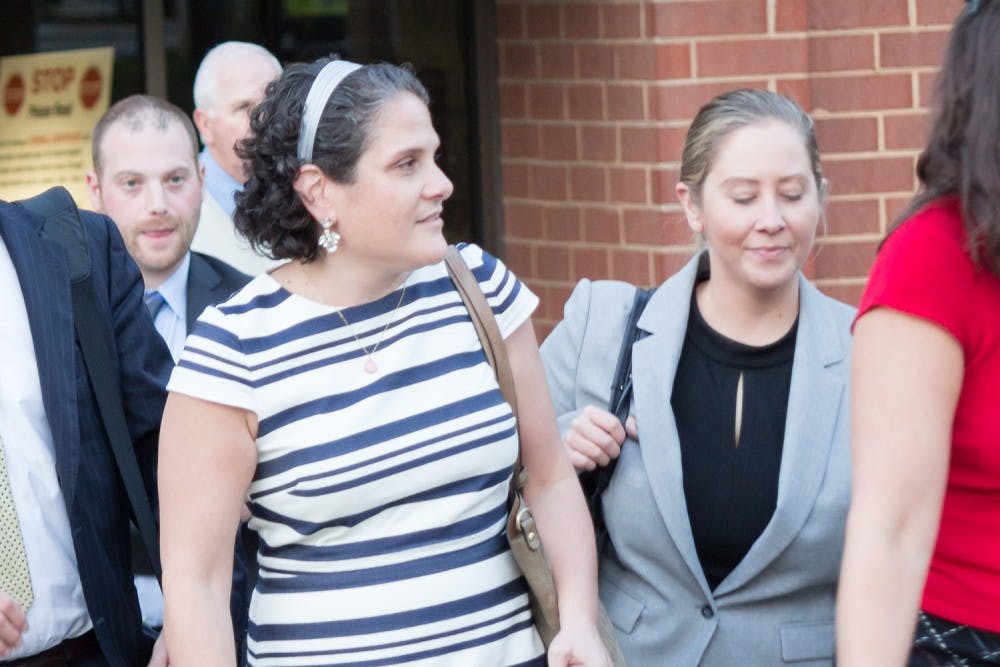A federal jury awarded former Associate Dean Nicole Eramo $3 million in damages Monday in her defamation suit against Rolling Stone magazine, Wenner Media, Inc. and writer Sabrina Rubin Erdely.
The jury previously found the defendants liable for actual malice against Eramo as a result of the publication of “A Rape on Campus” — an article published in November 2014 which alleged the gang rape of a student named Jackie at the Phi Kappa Psi fraternity house during her first year at the University.
A subsequent Charlottesville Police investigation found no evidence of Jackie’s claims.
Eramo claimed she was falsely depicted in the article as uncaring and indifferent towards sexual assault victims.
The jury reconvened for the 17th day to settle damages the defense owes Eramo, who asked for for $7.5 million in her suit. The defense was found guilty of “actual malice” toward Eramo in six of 14 statements the prosecution submitted to the court associated with the article “A Rape on Campus.” The jury was in deliberation for an hour and 45 minutes before coming to a decision.
Of the $3 million in awarded damages, $2 million will come from Erdely and $1 million from Rolling Stone and Wenner Media, Inc.
Eramo’s husband, Assoc. Prof. and Asst. Dean Kirt von Daacke told the jury about the feeling on Grounds the day the article was released.
“When the article came out,” von Daacke said, “it was as if someone had set the University of Virginia on fire.”
Von Daacke spoke of protests outside of Eramo’s office along with calls from colleagues and students for her dismissal.
“There were protesters outside her office everyday,” von Daacke said. “People were calling for her head on a platter, and we were miserable.”
When asked about the effect of the derogatory statements on Eramo, von Daacke said, “They destroyed her.”
“She withdrew,” von Daacke said. “She buried herself in whatever she was doing at work, and this had a traumatic effect on her home life.”
On Dec. 5, Rolling Stone republished the article with an editor’s note distancing itself from Jackie’s statements.
The republishing “didn’t change anything,” von Daacke said. “In fact it might have made things worse.”
The republishing destroyed Eramo a second time, he said, noting that the note did not retract statements about Eramo.
Before von Daacke spoke, Tom Clare, Eramo’s attorney, gave an opening statement urging the jury to award Eramo full damages.
“It’s always uncomfortable to talk about money,” he said Monday morning.
“No amount of money will take Nicole back to the days before the article was published,” Clare said. “But it is the only compensation the court provides.”
Clare asked the jury to consider the probable effect the article had on those who read it as well as the effect it had on Eramo. He highlighted the insult the words had for Eramo — including pain, embarrassment and humiliation. Clare told the jury it was up to them to put a value on the injuries caused.
The defense followed with its opening statement, in which Rolling Stone attorney Scott Sexton expressed the defense’s sorrow over the verdict determining the magazine to have acted in actual malice.
“This was tough medicine, but we want you to know it was heard,” Sexton said. “We respect your decision.”
Sexton asked the jury to focus on the actual damage caused by the six specific statements still part of the case. The jury has to decide the harm Eramo experienced based on evidence, not sympathy, Sexton said.
The prosecution called Eramo to the stand following the opening statements, and Clare asked her to discuss her life and career before the publication of “A Rape on Campus.” Eramo has lived in Charlottesville with her husband and son since 1999 and was a University dean at the time the article was published.
“I felt very blessed … I felt I was really valued and that was important to me,” Eramo said.
During her work as dean, Eramo said she felt privileged to work with students. She said she was proud to have many students as friends and treasured those relationships.
Clare then asked Eramo to recall the day “A Rape on Campus” was published.
“It was heartbreaking to read,” Eramo said. “It was like reading about somebody who had your name, and when I saw the picture, somebody who had your face, but didn’t recognize.”
Eramo struggled to hold back tears as she described the emotional event. She recalled feelings of devastation and fear of the unknown.
“I just wanted to disappear,” Eramo said.
Clare then directed the attention of the jury to several emails Eramo received in the days and weeks following the publication of the article. The emails contained strong negative sentiments toward Eramo and repeatedly requested her resignation.
“[The emails] put me in the lowest point I’ve ever been,” Eramo said.
Clare also addressed other factors in Eramo’s life impacted by the article including her health and career. Eramo underwent a previously scheduled surgery a month after the article came out, and Eramo said it did not help to be in that position and then have to go through a major surgery.
Concerning her current career, Eramo expressed the difference — that she now has less contact with students.
“I still mourn the loss of Dean Eramo,” Eramo said.
Throughout her testimony, Eramo continuously reiterated her sense of confusion and self-doubt after the publication of “A Rape on Campus.”
“How did I get here? How did this happen? What could I have done differently?” Eramo said. “I still can’t answer that.”







